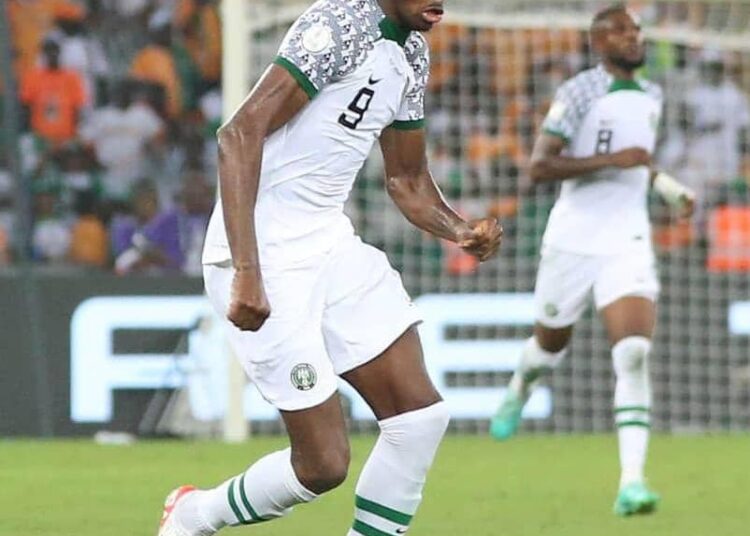Nigeria’s clash with Guinea-Bissau on Monday marks a momentous occasion – their 100th match in the Africa Cup of Nations!
This milestone in their 20th finals appearance comes with the tantalising opportunity to score their 140th goal in the competition since the country began taking part in 1963. Côte d’Ivoire 2023 is the nation’s 20th appearance in the finals.
Fresh off William Ekong’s strike against Côte d’Ivoire, another milestone beckons. Striker Victor Osimhen, seeking to add to his solitary AFCON goal, has the chance to emulate Victor Ikpeba, who netted Nigeria’s 70th goal in Nigeria’s 4-2 defeat of Tunisia in Lagos on 23rd January 2000 – the 22nd finals that Nigeria co-hosted with Ghana.
It is another 70 goals after, and opportunity beckons on another Victor, this time Victor Osimhen, to score Nigeria’s 140th goal by netting against the Wild Dogs. Like Victor Osimhen, Ikpeba was also an African Player of the Year (1997). The Napoli SC forward really needs to add to his tally of just one goal in the Africa Cup of Nations, having played only a cameo role in the Odion Ighalo-dominated 2019 finals in Egypt, and missing the 2021 finals in Cameroon due to injury.
Ighalo himself scored the country’s 130th goal when he netted against Tunisia in a 1-0 win for third place in 2019. He was top scorer of the 2019 finals with five goals.
Of the current squad, captain Ahmed Musa scored Nigeria’s 120th goal of the competition when he poked in Nigeria’s fourth in the 4-1 defeat of Mali in the 2013 semi-final in Durban.
A total of six Nigerian players are in the Hall of Fame of the top scorers of Africa Cup of Nations, with only ‘Goalsfather’ Rashidi Yekini (of blessed memory) in the double-figure category. He netted 13 goals in four successive tournaments between 1988 and 1994, emerging top scorer in 1992 and 1994.
Playmaker Jay-Jay Okocha scored seven goals in the AFCON, including emerging top scorer at the 2004 finals in Tunisia with four goals. He also scored Nigeria’s milestone 1,000th when he netted against South Africa in Monastir, Tunisia in 2004.
Olusegun Odegbami, Julius Aghahowa and Emmanuel Emenike are the others.
Odegbami, who has a total of six goals, was joint-top scorer in 1978 with three goals, alongside Ghana’s Opoku Afriyie and Uganda’s Philip Omondi. He also was joint top-scorer with Morocco’s Khaled al-Abyad (three goals) as Nigeria triumphed in 1980.
Aghahowa also scored a total of six goals, being joint top scorer with Patrick Mboma and Salomon Olembe of Cameroon in Mali in 2002 with three, having earlier scored another three goals when Nigeria co-hosted with Ghana in 2000.
Emmanuel Emenike was joint-top scorer of the 2013 finals in South Africa, with four goals, including a ferocious free-kick against Cote d’Ivoire in the fabled quarter-final clash in Rustenburg.





